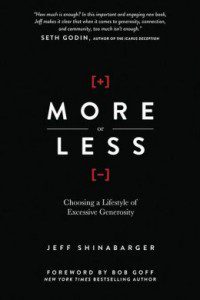“So you have no frame of reference here, Donny. You’re like a child who wanders into the middle of a movie and wants to know…” – Walter Sobchak (The Big Lebowski)
It’s a cliche right? The thirty-something hipster wakes up one day and realizes that there are actually other people on the planet. So they set out to make sense of it all, feeling as though they are the first ones to the party, the first ones to have these thoughts, the first ones to experience these emotions, all the while ignoring the fact that a whole generation of trailblazers and guides have been doing this for decades, dying in the process. I’ll be honest: in the back of my mind, I really thought this was what I was in for in More or Less.
I was so pleasantly surprised by this book. It’s a humble, vulnerable, memoir-like glimpse into author Jeff Shinabarger’s (and his wife’s), earnest attempt to live like Jesus called us to live.
More or Less: Choosing a Lifestyle of Excessive Generosity is a field guide for those who are attempting to dismantle a consumerist lifestyle and reach for something that is real. I wish I had 25 copies. I’d hand them out every time somebody in my community hits a certain critical moment that I see over and over.
The critical moment I’m talking about is that point when somebody has worked through cycle of production (work your tail off for money), and consumption (purchase stuff that is supposed to make your life better/complete), enough times to figure out that it’s a game they can’t win. The game is rigged to entice with the promise of fulfillment that it can never deliver. The promise is “more.” The con-game is that “more” will always leave us with less of what we truly desire and need for our lives – less contentedness, happiness, richness, energy, and so on. The game feeds off our discontent and will consume every single part of our lives that we are willing to give it – down to our very souls. It’s a serious work of grace to hit that critical moment and push through to what awaits us beyond… If we do decide to push through, then the adventure begins, and its time to dismantle everything we’ve been building in our consumerist life.
This book is the field guide for that deconstruction.
Ideas: I say field guide because it is very practical, but it is not a five step plan for how to change the world and your life in the process. The book makes no grand promises (except that you’ll find your life by losing it). Field guides are full of stories, information, ideas, practical solutions, warnings, and especially insights for navigating the environment, identifying all of the indigenous creatures… a field guide helps you to locate yourself in your environment, and to make the most of what is already there. It helps you to name the things that live in your world, to avoid the things that can harm you, and to learn how to work with the natural resources you didn’t know were at your fingertips all along.
Stories: Shinabarger has banked a ton of stories, each of which can help us make sense of our own story. For instance, he tells about a time when he and his wife overspent on presents one Christmas. When the Visa bill came they knew they had to tighten the family belt. So they decided to try and eat for a whole month only on the food they already had in their house. They made it seven weeks without grocery shopping. The book is one story after another like that: adventures in messing with your small vision of the world in the hopes that if you’ll start to shed some of the dead weight in your life, then you might actually become more of a human being than you ever thought possible.
Stats: A few times while reading I had the thought that this book is a little bit like Rich Christians in an Age of Hunger for hipsters. This is one aspect of the book – it does do that stark contrast thing that Ronald Sider’s been doing for decades. EX: If you make at least $2,500 a year, you are in the top 14.93% of the richest people in the world. EX: If you make $40,000 a year then one day’s wages is $160 – compare that to half the world’s population who lives on less than $2 a day. We can never see our lives clearly if we are only comparing ourselves to our affluent neighbors. There’s a helpful amount of that in here.
The book doesn’t over promise, which I really appreciate. And it’s not stunt-journalism. It is just an honest guide for those who aren’t afraid to go walking around in the wilderness for a few years, in the hopes that God will give them a new imagination for what an abundant life could be like. If you are approaching the critical moment of disillusionment with consumerist culture, if you are already in the turn… moving away from consumerist values and pursuits, if you are already well on your way toward this goal, then you should get More or Less for your library.
It’s pretty clear that Shinabarger is not trying to write a book, he’s trying to foment a movement. I hope it works. If you are interested in learning more, they’ve built a kind of interactive experience with videos to watch after certain chapters. You can watch them here: http://moreorlessbook.com//#videos













